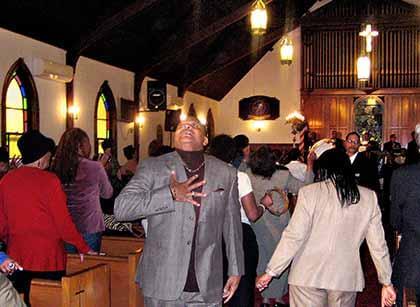By Ivan Pereira
The Macedonia A.M.E. Church in Flushing started out as a place for minority groups to gather and share their faith at a time when they were being persecuted across the nation.
Today, it is a large and bustling place of worship that not only continues to spread its spiritual message with prayer, but also through community service.
The church, at 37-22 Union St., began a yearlong celebration of its 200th anniversary with a special mass that drew in hundreds, according to Carolyn Scavella, a lifelong member of the church and the chairwoman of its anniversary celebration committee.
“We all feel a great joy and a sense of our heritage,” she said.
Almost all of the church’s 1,000 members were on hand for the afternoon mass, coming from neighborhoods across Queens, including Bayside, Jackson Heights and St. Albans, according to Scavella. The mass looked back at the church’s history that had its roots during the Underground Railroad era in American history.
Around the turn of the 19th century, a group of free blacks, native Americans and other minorities gathered in Flushing to celebrate mass, and in 1811 their church was officially ratified by the African Methodist Episcopal Church, Scavella said. Worshipers began praying out of a single-family home, but the church became popular among residents who were victims of prejudice and it grew tremendously through the years.
“This is where the people were. It was their community and at that time there were only two churches in Flushing,” Scavella said.
Over the two centuries, the church building went through several physical changes, including three major renovations that added additional floors, a larger prayer space and a multipurpose center. Some of the rooms also included compartments that Scavella said may have been used to hide slaves from the South who were migrating north to Canada.
Despite its popularity, the church had to fight to keep its building untouched by the rest of the community when the surrounding commercial district began to grow. When the city erected its municipal parking lot on Union Street, it used eminent domain to acquire some of the properties that were on the land.
Church officials fought to preserve their building and the city allowed them to keep the space while the other properties were destroyed for the parking lot.
“By all rights we should not be here, but we survived,” Scavella said.
The church member said Macedonia’s services reach beyond the pulpit. It offers dozens of activities to members of the community, including a youth basketball league, choirs and religious studies.
Over the last few years, the church’s food pantry and soup kitchen programs have become more popular, according to Scavella.
“Any Wednesday you can come by here and you’ll see us feeding 400 people,” she said.
The mass is just the first in a series of events to mark the 200 years. In August, the church will be holding a homecoming picnic and in December it will have a special anniversary banquet.
“We’ve grown so much and we really want to express joy,” Scavella said.
Reach reporter Ivan Pereira by e-mail at ipereira@cnglocal.com or by phone at 718-260-4546.



































